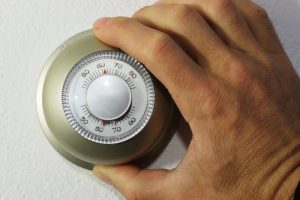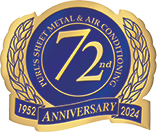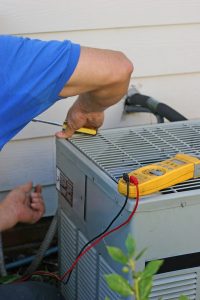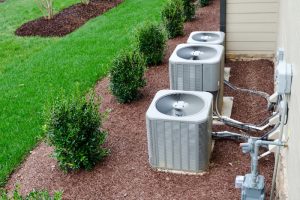 You want to avoid HVAC repair in Fresno, CA as much as possible. Even though fall has now officially arrived, the Central Valley is still experiencing blistering hot days that can reach the 90s. Your home’s air conditioning system has hard work ahead, and if you aren’t cautious about running it, you may drive it into the ground and cause an expensive repair or replacement.
You want to avoid HVAC repair in Fresno, CA as much as possible. Even though fall has now officially arrived, the Central Valley is still experiencing blistering hot days that can reach the 90s. Your home’s air conditioning system has hard work ahead, and if you aren’t cautious about running it, you may drive it into the ground and cause an expensive repair or replacement.
Your air conditioner has limits. For example, the AC can’t lower the temperature in your house to the point where water would freeze. (Not that you would want to.) To help you know how best to keep your cooling system running in good shape at the end of the season, we’re going to look at your central air conditioner’s cooling limits.


 Of all the troubles you might encounter with your air conditioning system, dirty sock syndrome is the one that triggers the most immediate reaction. It’s right there in the name—it sounds like something you absolutely don’t want in your house!
Of all the troubles you might encounter with your air conditioning system, dirty sock syndrome is the one that triggers the most immediate reaction. It’s right there in the name—it sounds like something you absolutely don’t want in your house! We’ve written before about the signs to watch for that will warn you it’s time to schedule professional
We’ve written before about the signs to watch for that will warn you it’s time to schedule professional  When your home’s air conditioning system is running during the summer, you will occasionally hear the sound of water dripping coming from the indoor cabinet. This is normal—you are hearing the sound of the water condensation that collects along the evaporator coil dripping down into a pan beneath it. This water (called condensate) is a standard part of how your central air conditioning system removes heat from the air. Once the water collects in the condensate pan, it leaves the house through a drain and line that leads to the outside.
When your home’s air conditioning system is running during the summer, you will occasionally hear the sound of water dripping coming from the indoor cabinet. This is normal—you are hearing the sound of the water condensation that collects along the evaporator coil dripping down into a pan beneath it. This water (called condensate) is a standard part of how your central air conditioning system removes heat from the air. Once the water collects in the condensate pan, it leaves the house through a drain and line that leads to the outside. Our summer weather can sometimes arrive abruptly during spring. We’ll switch from cloudy and cool weather straight to the big heat. You want to know that the first time you need your air conditioning system for the year that it will turn on and do its job right.
Our summer weather can sometimes arrive abruptly during spring. We’ll switch from cloudy and cool weather straight to the big heat. You want to know that the first time you need your air conditioning system for the year that it will turn on and do its job right. One of the more common problems that affects residential air conditioning systems is refrigerant leaks. An AC is designed to work with a specific amount of refrigerant, known as the system’s charge. The AC doesn’t use up the refrigerant as it runs, so under ideal circumstances, the refrigerant will remain at the same charge for the life of the system.
One of the more common problems that affects residential air conditioning systems is refrigerant leaks. An AC is designed to work with a specific amount of refrigerant, known as the system’s charge. The AC doesn’t use up the refrigerant as it runs, so under ideal circumstances, the refrigerant will remain at the same charge for the life of the system. During a hot summer here in the Central Valley, you’ll want your air conditioning system to work at its best. This means reliable, even cooling around the rooms, and utility bills that don’t rise too high. Standard malfunctions can threaten your AC’s performance, but they aren’t the only danger to the well-working of your air conditioning system. Many people don’t realize that poor ductwork is often a serious problem for cooling systems.
During a hot summer here in the Central Valley, you’ll want your air conditioning system to work at its best. This means reliable, even cooling around the rooms, and utility bills that don’t rise too high. Standard malfunctions can threaten your AC’s performance, but they aren’t the only danger to the well-working of your air conditioning system. Many people don’t realize that poor ductwork is often a serious problem for cooling systems. Refrigerant loss is one of the major problems an air conditioning system may encounter during its service life. And it’s not only a problem that occurs in aging, over-the-hill ACs. An air conditioning system that’s been in service for around 5 to 6 years can develop corrosion along its refrigerant lines because of exposure to formaldehyde in the air. It’s wise to always watch for indications that your AC, no matter how old it is, may be losing refrigerant to leaks:
Refrigerant loss is one of the major problems an air conditioning system may encounter during its service life. And it’s not only a problem that occurs in aging, over-the-hill ACs. An air conditioning system that’s been in service for around 5 to 6 years can develop corrosion along its refrigerant lines because of exposure to formaldehyde in the air. It’s wise to always watch for indications that your AC, no matter how old it is, may be losing refrigerant to leaks: